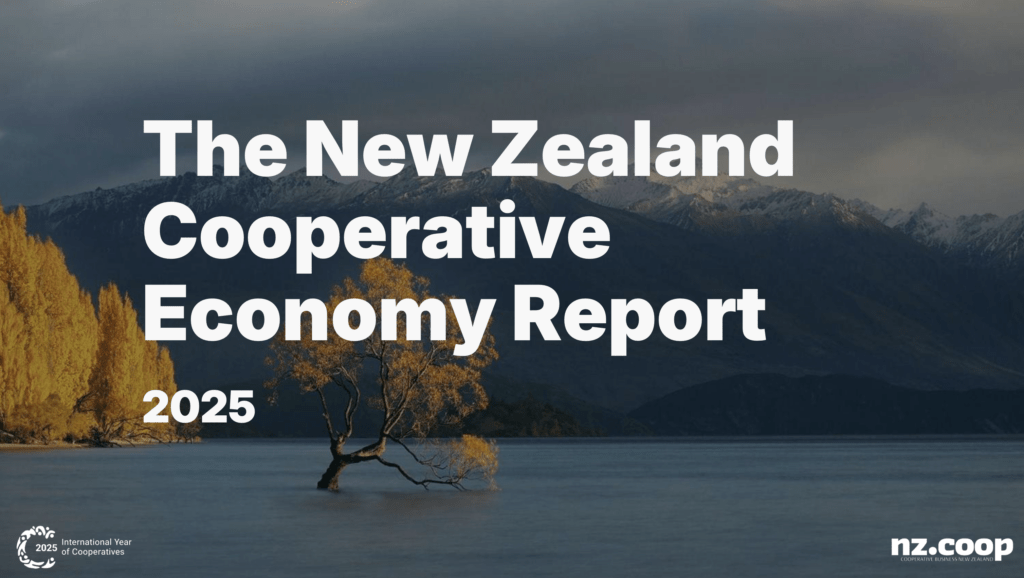Co-ops in New Zealand are outperforming the wider business sector in terms of resilience, job provision and revenue, the latest figures reveal.
Sector apex Cooperative Business New Zealand compiled the data for the NZ Cooperative Economy Report 2025.
The study found that while co-ops make up just 0.04% of companies in New Zealand, they live nearly five times longer than an average business in the country. The top 30 generate revenue equivalent to 12.5% of the national GDP, employ more than 49,000 people (1.5% of the workforce) and serve 1.66 million members.
Co-ops lift productivity for smaller firms through pooled procurement and shared services, the apex adds, and “anchor prosperity locally via member ownership and regional footprints”.
“Cooperatives in New Zealand absolutely punch above their weight,” added Cooperative Business NZ CEO Saya Wahrlich. “They are more than businesses; they’re long-term partners in our economy and our communities.
“Co-operatives build a better world, and this report shows how they’re doing just that in New Zealand.”
In terms of resilience, the average age of a currently registered limited company in New Zealand s just over 11 years, compared to 52.3 for co-ops, the report says.
“The higher survival rate of co-operatives compounds productivity and flows through to support the longevity of thousands of small companies that are co-op members,” it adds. “Patient, member ownership lets co-ops reinvest through cycles, keep know-how in the firm, and pass assets, skills and relationships from one generation to the next.
“The result is steadier R&D and technology adoption, continuous people development and resilience when shocks hit.”
Total revenue for the top 30 co-ops was NZ$51,881 in 2024 – up from $41,652 in 2020, employing 48,743 people, up from 41,159.
The largest co-op by revenue is dairy Fonterra, followed by Foodstuffs North Island and kiwi fruit marketing co-op Zespri.
The report gives specific examples of work co-ops do, including in terms of training and skills development. It looks at Foodstuffs, the grocery business owned by co-ops Foodstuffs North Island and Foodstuffs South Island.
Related: A record-breaking year for UK co-operatives and mutuals
It offers specific employer-educator programmes such as internships and apprenticeships, alongside retail programmes such as the Future Foodies Gateway Programme and the Girls Who Own leadership development programme.
Last year, Foodstuffs South Island supported 1,001 learners across 87 professional development programmes, ranging from leadership training to technical qualifications.
As with much of the rest of the world, succession planning is a challenge, with more than half our New Zealand’s 17,320 farm and orchard owners reaching retirement age in the coming decade, and $150bn in agricultural assets dependent on successful succession.
“However, co-ops and mutuals are stepping into the challenge,” says the report, noting director development programmes at several co-ops.
Insurer Farmers Mutual Group has trialled associate directorships to give emerging leaders governance experience, while large co-ops such as Silver Fern Farms, LIC and Farmlands have invested in the To The Core shared leadership programme. Meanwhile Fonterra’s Governance Development Programme has been running since 2006.
This feeds into the way co-ops are working to address New Zealand’s productivity problems, the report adds.
“Co-ops contribute in four key ways – pooling resources, sharing platforms, investing in innovation, and retaining value locally, making systemic contributions to productivity growth in ways that traditional investor-owned firms often do not, or cannot.”
Related: New Zealand’s Co-op Bank tops consumer satisfaction survey
Examples include digitisation projects at Foodstuffs South Island and Fonterra, while health insurer UniMed has driven efficiency by automating its claims processing.
With research and development, the report highlights AgriZeroNZ, a partnership where co-ops including Fonterra, Ravensdown and Silver Fern Farms have partnered with the government and collectively committed more than $170m to methane reduction research and technology.
Co-ops are also developing infrastructure, including extensive water storage and delivery systems in Canterbury, “underpinning the productivity of one of our most important agricultural regions“.
Productivity is also driven by money being returned to local economies, says the report. For instance, Foodstuffs South Island returned over $2.3m to South Island communities in 2024; Fonterra distributed $8.38 per kgMS to its farmer members in 2024; and Nelson Building Society channelled a record $1.4m of sponsorships back into more than 300 local organisations.
The report also highlights the strength of the co-op model in times of crisis, looking at the sector’s response to Cyclone Gabrielle, which devastate parts of North Island in February 2023. This included distribution of emergency goods and donations from hardware store co-op Mitre 10, an emergency response from Fonterra that included the use of helicopters to reach cut-off communities and the provision of emergency veterinary supplies, alongside fundraising and donations.
Meanwhile, Ballance Agri-Nutrients created a $1m Weather Relief Fund for the Rural Support Trust, then deployed its Super Air aviation team to move supplies, while science and geospatial teams ran silt-revegetation trials in Esk Valley and mapped more than 1,000 ha of slips to guide farm recovery.
The cyclone also brought a hit to FMG, which faced the largest claims event in its 118-year history. Robust reinsurance and capital reserves underpinned the response so claims could be paid while the mutual remained sound.
“Co-ops and mutuals leveraged pre-existing community trust, local assets and people, and sector-specific capabilities to close practical gaps like food, fuel, fencing, feed, finance, and they acted fast,” says the report.
“Co-operatives are more than just a business structure,” said Cooperative Business NZ chair Mike Brown. “They are a reflection of who we are as a nation – collaborative, community-driven, and forward-thinking.
“From our rural heartlands to our urban centres, co-ops have long played a central role in shaping our economy and supporting the well-being of our people. In this United Nations International Year of Cooperatives, it is fitting that we acknowledge the sector’s sizeable role in our economic footprint. Far less value drifts offshore in a co-op model.”

